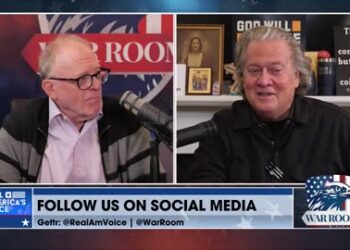Oren Cass and Steve Bannon delivered a high-stakes briefing outlining the dangers of exporting advanced AI chips to China. This conversation is crucial: it frames AI export controls not just as economic issues, but as pivotal national security risks. The key document—the letter Cass referenced—is essential reading for policymakers and strategic advisors. Contact details for Oren Cass are included for follow-up dialogue.
THE LETTER:
Excellent letter with very strong and broad-based support, including many former Trump nat sec officials.
Licensing H20 chip sales repeats the mistake corporations made for a generation, thinking we can transfer tech into China to gain a permanent foothold. Now how it works. https://t.co/CmtHwedPwp
— Oren Cass (@oren_cass) July 28, 2025
QUICK WARROOM CLIPS:
OREN CASS: Every AI chip we sell to China speeds them up and slows us down.
We don’t need "deals” with adversaries.
We need a hard cutoff and a government that puts America’s future over Nvidia’s profits.@oren_cass pic.twitter.com/zFF41zP0E8
— Bannon’s WarRoom (@Bannons_WarRoom) July 28, 2025
OREN CASS: We are ahead of the CCP in AI.
But selling chips to China puts that lead, and our safety, at risk.
Nvidia’s CEO is opening research centers in China while pretending otherwise. Enough.@oren_cass pic.twitter.com/zx5XMVNRGk
— Bannon’s WarRoom (@Bannons_WarRoom) July 28, 2025
SITUATION OVERVIEW:
During a Monday segment on WarRoom, Cass sounded the alarm on recent moves by the Trump administration to green-light the export of advanced AI chips to China. He argued these actions are strategically flawed, accelerating adversarial capabilities while depleting America’s own chip resources.
KEY INTEL: WHY THIS MATTERS
National Security Threat:
Cass emphasized that exporting AI chips to China would "simultaneously speed up China’s progress and slow us down.” These chips are not basic commodity items—they are foundational building blocks for AI-driven systems in defense and commerce.
Strategic Decoupling Imperative:
Rejecting gradual "decoupling,” Cass advocated a more assertive economic disentanglement, calling it "heartbreak,” not decoupling. The goal: separate U.S. and Chinese tech ecosystems entirely in strategic sectors.
Consistency in Policy:
Cass warned that flip-flopping on export control policy undermines U.S. credibility. He stressed the need for unwavering enforcement of restrictions to ensure allies and corporations take them seriously.
Corporate Conflicts:
He criticized Nvidia and other tech companies for prioritizing profit in China over American strategic interests—accusing them of misleading the public by downplaying chip exports to China even while supporting expansion there.
- RECOMMENDED ACTIONS
Disseminate the referenced letter widely across policy circles. - Engage with Oren Cass and collaborators at American Compass to coordinate messaging and policy recommendations.
- Coordinate messaging through conservative media outlets and digital platforms, emphasizing the national security argument over corporate talking points.
DIRECT CONTACT: OREN CASS
X (Twitter): @Oren_Cass
Policy Organization: AmericanCompass.org
Magazine: CommonPlace.org
Cass is open to further briefing requests, collaboration, and discussion of policy proposals.
Cass credited Americans for Responsible Innovation and American Compass for rallying national security heavyweights to author the letter.
Bannon framed this issue as part of a broader pattern: giving Beijing strategic advantages through dependency and corporate negligence.
The analogy drawn: enabling China to advance technologically while undercutting U.S. interests is worse than historical economic vulnerabilities—as Cass said, the precedent of wartime trade interdependence with enemy states.
CONCLUSION
As advanced AI technologies move from labs to chips in the global supply chain, the decisions made now determine strategic dominance. Reviewing the referenced letter is mission-critical for anyone shaping tech or trade policy.
For more context, watch this full interview featuring Oren Cass:




